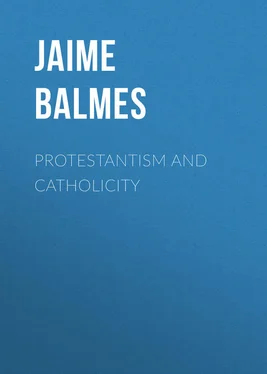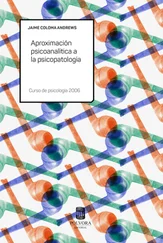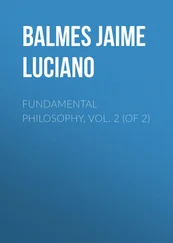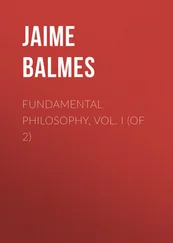Jaime Balmes - Protestantism and Catholicity
Здесь есть возможность читать онлайн «Jaime Balmes - Protestantism and Catholicity» — ознакомительный отрывок электронной книги совершенно бесплатно, а после прочтения отрывка купить полную версию. В некоторых случаях можно слушать аудио, скачать через торрент в формате fb2 и присутствует краткое содержание. Жанр: foreign_antique, foreign_prose, на английском языке. Описание произведения, (предисловие) а так же отзывы посетителей доступны на портале библиотеки ЛибКат.
- Название:Protestantism and Catholicity
- Автор:
- Жанр:
- Год:неизвестен
- ISBN:нет данных
- Рейтинг книги:3 / 5. Голосов: 1
-
Избранное:Добавить в избранное
- Отзывы:
-
Ваша оценка:
- 60
- 1
- 2
- 3
- 4
- 5
Protestantism and Catholicity: краткое содержание, описание и аннотация
Предлагаем к чтению аннотацию, описание, краткое содержание или предисловие (зависит от того, что написал сам автор книги «Protestantism and Catholicity»). Если вы не нашли необходимую информацию о книге — напишите в комментариях, мы постараемся отыскать её.
Protestantism and Catholicity — читать онлайн ознакомительный отрывок
Ниже представлен текст книги, разбитый по страницам. Система сохранения места последней прочитанной страницы, позволяет с удобством читать онлайн бесплатно книгу «Protestantism and Catholicity», без необходимости каждый раз заново искать на чём Вы остановились. Поставьте закладку, и сможете в любой момент перейти на страницу, на которой закончили чтение.
Интервал:
Закладка:
While acknowledging that the principal cause of Protestantism is to be found in the human mind, it is easy to abstain from these unjust comparisons; and M. Guizot might have avoided the inconsistency to which we have alluded. He might have discovered the origin of the fact in the character of the human mind; he might, at the same time, have shown the greatness and importance of it, while simply explaining the nature and position of the societies in which it appeared. In fine, he might have observed that it was no extraordinary effort , but a mere repetition of what has happened in every age; and a phenomenon, the character of which depended on the particular state of the atmosphere in which it was produced.
This way of considering Protestantism as an ordinary event, increased and developed by the circumstances in which it arose, appears to me to be as philosophical as it is little attended to. I shall support it by another observation, which will supply us with reasons and examples at the same time.
The state of modern society for three hundred years has been such, that all the events that have occurred have acquired a character of generalization, and consequently an importance, which distinguishes them from all the events of a similar kind which occurred at other times and in a different social state. If we examine the history of antiquity, we shall see that all the events therein occurring were isolated in some sort from each other; this was what rendered them less beneficial when they were good, and less injurious when they were bad. Carthage, Rome, Sparta, Athens, all these nations more or less advanced in the career of civilization, each followed its own path, and progressed in a different way. Ideas, manners, political constitutions, succeeded each other, without our being able to perceive any influence of the ideas of one nation on those of another, or of the manners of one nation on those of another; we do not find any evidence of a tendency to bring nations to one common centre.
We also remark that, except when forced to intermix, ancient nations could be a long time in close proximity without losing their peculiarities, or suffering any important change by the contact.
Observe how different is the state of things in Europe in modern times. A revolution in one country affects all others; an idea sent forth from the schools agitates nations and alarms governments. Nothing is isolated, every thing is general, and acquires by expansion a terrible force. It is impossible to study the history of one nation without seeing all the others make their appearance on the stage; and we cannot study the history of a science or an art without discovering a thousand connections with objects which do not belong to science or to art.
All nations are connected, objects are assimilated, relations increase. The affairs of one nation are interesting to all the others, and they wish to take part in them. This is the reason why the idea of non-intervention in politics is, and always will be, impracticable; it is, indeed, natural for us to interfere in that in which we are interested.
These examples, although taken from things of a different kind, appear to me very well calculated to illustrate my idea of the religious events of that period. Protestantism, it is true, is thereby stripped of the philosophic mantle by which it has been covered from its infancy; it loses all right to be considered as full of foresight, magnificent projects, and high destinies, from its cradle, but I do not see that its importance and extent are thereby diminished; the fact itself, in a word, is unimpaired, but the real cause of the imposing aspect in which it has presented itself to the world is explained.
Every thing, in this point of view, is seen in its just dimensions; individuals are scarcely perceived, and abuses appear only what they really are – opportunities and pretexts; vast plans, lofty and generous ideas, and efforts at independence of mind, are only gratuitous suppositions. Thence ambition, war, the rivalry of kings, take their position as causes more or less influential, but always in the second rank. All the causes are estimated at their real value; in fine, the principal causes being once pointed out, it is acknowledged that the fact was sure to be accompanied in its development by a multitude of subordinate agents. There remains still an important question in this matter, viz. what was the cause of the hatred, or rather the feeling of exasperation, on the part of sectarians against Rome? Was it owing to some great abuse, some great wrong on the part of Rome? There is but one answer to make, viz. that in a storm, the waves always dash with fury against the immovable rock which resists them.
So far from attributing to abuses all the influence which has been assigned to them on the birth and development of Protestantism, I am convinced, on the contrary, that all imaginable legitimate reforms, and the greatest degree of willingness on the part of the Church authorities to comply with every exigence, would not have been able to prevent that unhappy event.
He has paid little attention to the extreme inconstancy and fickleness of the human mind, and studied its history to little purpose, who does not recognise in the event of the sixteenth century one of those great calamities which God alone can avert by a special intervention of his providence. 5 Конец ознакомительного фрагмента. Текст предоставлен ООО «ЛитРес». Прочитайте эту книгу целиком, купив полную легальную версию на ЛитРес. Безопасно оплатить книгу можно банковской картой Visa, MasterCard, Maestro, со счета мобильного телефона, с платежного терминала, в салоне МТС или Связной, через PayPal, WebMoney, Яндекс.Деньги, QIWI Кошелек, бонусными картами или другим удобным Вам способом.
CHAPTER III.
EXTRAORDINARY PHENOMENON IN THE CATHOLIC CHURCH
The proposition contained in the concluding lines of the last chapter suggests a corollary, which, if I am not mistaken, offers a new demonstration of the divine origin of the Catholic Church. Her existence for eighteen centuries, in spite of so many powerful adversaries, has always been regarded as a most extraordinary thing. Another prodigy, too little attended to, and of not less importance when the nature of the human mind is taken into account, is, the unity of the Church's doctrines, pervading, as it does, all her various instructions, and the number of great minds which this unity has always enclosed within her bosom .
I particularly call the attention of all thinking men to this point; and although I cannot hope to develop this idea in a suitable manner, I am sure they will find in it matter for very serious reflection. This method of considering the Church may perhaps recommend itself to the taste of some readers on another account, viz. because I shall lay aside Revelation, in order to consider Catholicity, not as a Divine religion, but as a school of philosophy.
No one who has studied the history of letters can deny that the Church has, in all ages, possessed men illustrious for science. The history of the Fathers of the first ages of the Church is nothing but the history of the most learned men in Europe, in Africa, and in Asia; the list of learned men who preserved, after the irruption of the Barbarians, some remains of ancient knowledge, is composed of churchmen. In modern times you cannot point out a branch of human knowledge, in which a considerable number of Catholics have not figured in the first rank. Thus there has been, for eighteen hundred years, an uninterrupted chain of learned men, who were Catholics, that is, men united in the profession of the doctrines taught by the Catholic Church. Let us lay aside for a moment the divine characteristics of Catholicity, to consider it only as a school or sect; I say, that in the fact which I have pointed out, we find a phenomenon so extraordinary, that its equal cannot be found elsewhere, and that no effort of reason can explain it, according to the natural order of human things.
Читать дальшеИнтервал:
Закладка:
Похожие книги на «Protestantism and Catholicity»
Представляем Вашему вниманию похожие книги на «Protestantism and Catholicity» списком для выбора. Мы отобрали схожую по названию и смыслу литературу в надежде предоставить читателям больше вариантов отыскать новые, интересные, ещё непрочитанные произведения.
Обсуждение, отзывы о книге «Protestantism and Catholicity» и просто собственные мнения читателей. Оставьте ваши комментарии, напишите, что Вы думаете о произведении, его смысле или главных героях. Укажите что конкретно понравилось, а что нет, и почему Вы так считаете.












